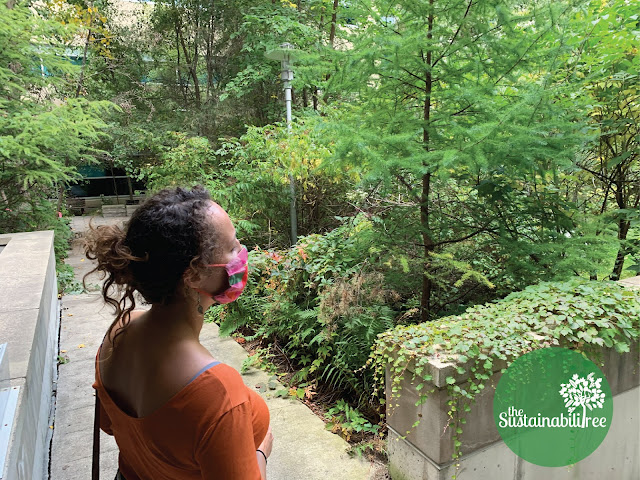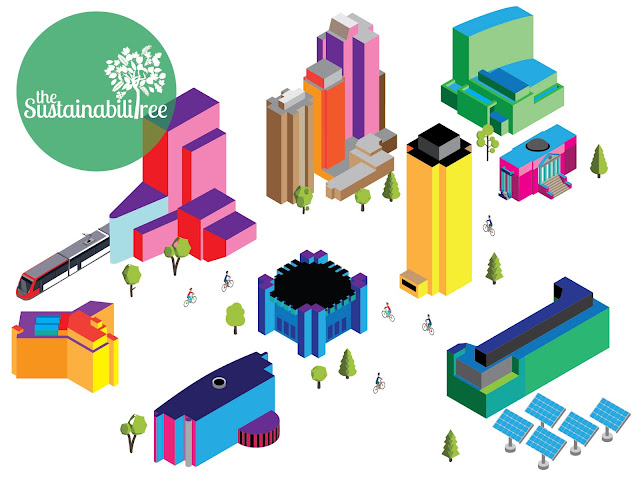uOttawa heat map art. Monday July 22nd might have been a wholly unmarkable day for you. It was a fairly hot day in a fairly hot month, which of course has been part of a fairly hot summer. If you live in this little part of the world, you might have noticed a lack of rain and a hint of smoke in the air from the forest fires in central and western Canada. What you might not have known was that the record for the hottest recorded in human history was being set. Many news outlets reported on the record breaking temperature but it didn't get much coverage (the world has a lot of complicated things happening right now). I think this kind of information tends to make people's eyes glaze over. "Oh yes, yet another time we broke the record for the hottest day..." It seems to happen so often that people have become numb to the news. This is problematic because the increase in temperature has a bunch of very serious and dangerous impacts to the natural environment and to peop...
Search Blog
Hit enter to search or ESC to close
Featured Posts
Showing posts with the label green space
Posts
- Get link
- X
- Other Apps
Posted by
uOttawaSustain
A garden to commemorate friends
Concept art of the transformation garden There are many reasons why you might want to create a garden. Gardens are spaces where nature and recreation come together to create a sense of calmness or a place to escape. Often gardens are covered with greenery (planned or natural), they have places to sit or things to see. They sometimes focus on growing food; or providing habitat for pollinators; or gathering together rare or native plants. Sometimes you create a garden because you want to make a statement, and sometimes you create a garden to preserve the past. But sometimes you create a garden because you have lost a friend and colleague. This is one of those gardens. Concept art of the transformation garden The University of Ottawa has dozens of gardens, or at least green spaces that could be considered proto-gardens. Personally I don't ascribe to the idea that any patch of grass is considered a garden. I think that there needs to be some something that draws you to the space and g...
- Get link
- X
- Other Apps
Posted by
uOttawaSustain
Rethinking our campus greenspace
Green roof on the Tabaret Building Our office has been working at improving sustainability on campus since 2006 and I am happy to say that we have had a lot of success. But one of the areas that we are still hoping to improve after all these years in our green space. What is considered by many sustainability-minded institutions to be the crown jewel of their campus (lush green spaces) is a bit of a sticking point here at uOttawa. You see, a lot of older institutions were created through land grants or large land donations. This gave institutions the ability to finance the expansion of their programs by leasing and selling land. Not unliked these institutions, the University of Ottawa was founded based on a land donation by the Besserer family. But unlike some other land grants, it was a small parcel of land which means that since then the institutions has had to slowly try to buy up surrounding land. Sometimes this works... sometimes it doesn't. After years of purchasing land and ...
- Get link
- X
- Other Apps
Posted by
uOttawaSustain
Building a Food Forest at uOttawa
Years ago, I attended the World Urban Forum (WUF) in Vancouver. WUF is a gathering of groups who are obsessed with urbanism and how, if done correctly, it could help solve many of the world's problems. The gathering, hosted by the United Nations, really is a geekfest of policy ideas, new technologies, and networking opportunities. But the thing that really caught my eye while I was there was an installation representing an Edible Landscape. For those who don't know, an edible landscape is basically a garden where all the plants are switched for edible varieties. By doing this, people can grow food and have a lovely garden aesthetic (existing in harmony rather than in opposition). Fast forward a bit more than a decade and edible landscapes are starting to take root at uOttawa. In 2021, the Office of Campus Sustainability started filling some planters on campus with edible plants instead of the traditional non-edible ones. An extension of the community gardens, the edible land...
- Get link
- X
- Other Apps
Posted by
uOttawaSustain
All the New Things on Campus Since You Have Been Gone
When news finally settled and it was determined that uOttawa, along with every other institution in Canada, was going to close its doors for an entire academic season, there were a lot of projects that were still ongoing. Fast forward to almost two years later and people are starting to come back to the campus, and those projects were completed. So let's take a quick tour of some of the sustainability things that happened on campus while you were gone! UCU Park Just behind the UCU (near the Pivik entrance) the land has been completely landscaped and a new park was created. The small park is a 4-season park with seating, a stone dust path, and a bunch of Indigenous, native, and edible plants. If you are in the garden at just the right time of the year, you can see the wild raspberries! Other improvements include a safer declined path to the building and an expanded terrace near the entrance doors (the former smokers pit) with a new seating area. Morisset Window Mural Safe Wings wor...
- Get link
- X
- Other Apps
Posted by
uOttawaSustain
What Has COVID Taught us About How to Restructure the University Campus
One year in and we are can sort of see the light at the end of the tunnel. With a COVID vaccine on the way, we can take comfort that many of the restrictions we see today will be toned down. But, with vaccines having an efficacy rate of up to 95%, that could still potentially mean a lot of cases after everyone is inoculated. (5% of Canada's population of 35 Million = 1,750,000 potential cases across the country after vaccination, but herd immunity will slow down and prevent infections) So it is prudent to think that there will still be the need for some COVID precautions after mass vaccine campaigns are finished. But beyond COVID, there are other reasons we might want to keep up some precautions. This time last year, Canada had reported over 26,000 cases of the flu, and this year there were 57 ... IN THE ENTIRE COUNTRY!!! Clearly, with a bit of prudence, there can be a significant drop in communicable diseases. At the start of the summer of 2020, people were venturing outsid...
- Get link
- X
- Other Apps
Posted by
uOttawaSustain
FAQs - What if Every Roof Was a Green Roof at uOttawa
After our last post about green roofs at the University of Ottawa, I got a lot of questions about why we can't have green roofs everywhere on campus. If the answer was simple, I wouldn't have to write a entire blog post about it... but since I am writing a post... you can probably take the hint that this is a bit more complicated then a yes/no kind of thing. As a quick reminder, the University has a design imperative in place that implies green roofs will be installed in any case where the building can take the weight without a new support system, that the building is still going to be around in 20 years, or if the roof wouldn't serve better as a place for solar panels. Photo credit - kingcounty.gov HOW MUCH CO2 COULD WE SEQUESTER? First thing people were asking me about was sequester CO2. If roofs can take carbon out of the air, why not do more of this? Of course all plants sequester CO2 but a green roof can't do as much as a tree and certainly not as much as a peat bo...
- Get link
- X
- Other Apps
Posted by
uOttawaSustain
The Benefits of Raised Bed Gardens in uOttawa Community Garden
The University of Ottawa community garden on King Edward has been around for some time. It is a place where staff, students, and Sandy Hill community members are encouraged to grow their own food and preserve green spaces. Not everyone has the opportunity or space to garden; it is therefore very important to have community gardens as they give individuals the ability to grow and have access to their organic fruits and vegetables. Recently, the University of Ottawa has constructed seven raised bed gardens, built with the help of some reused materials on campus (old banners from Alumni week are being used as moisture barriers). For those who don’t know, raised bed gardens are elevated boxes filled with soil separated from the ground to grow plants. This method of gardening comes with many advantages. First, gardeners tend to suffer from less back pain because they do not have to bend over as much to do their gardening. It also makes it easier to access if you are in a wheelchair o...
- Get link
- X
- Other Apps
Posted by
uOttawaSustain
Student Blog - Make uOttawa Wild Again
This summer we are featuring a series of blog posts from students in the ENV 2301 course "History of Environmental Thought". We are super happy to highlight the thoughts and ideas of these bright young individuals. “To build a road is so much simpler than to think of what the country needs”. Aldo Leopold questioned the destruction of natural environments through economic pursuits. The University of Ottawa could learn a lesson from this quote as it has largely neglected the need for green spaces, despite some efforts. Rewilding means letting nature take its course as it did before urbanization invaded. It is arguably one of the greatest solutions to climate breakdown through capturing carbon from the air, especially through restoring trees, and allowing animals to maintain balance within ecosystems. This act of designating space that species can re-inhabit inherently promotes the flourishing of biodiversity while protecting and preserving the land from development a...
- Get link
- X
- Other Apps
Posted by
uOttawaSustain
uOttawa and the Case for Green Roofs
A few weeks ago I was sitting in a meeting with my boss going over the business case for why the University of Ottawa should change our building standards to build green roofs whenever possible (meaning so long as the building can take the weight). The crux of the argument came down to two things... is it better for the planet and does it save costs? Wait, this is too far ahead, I need to go back a bit. A few months ago one of our awesome student employee created a wonderful business case about why the University of Ottawa should install green roofs on campus. She created a case that took into account of bunch of factors, including construction costs, energy savings, storm water management, operating costs, and much more. Ultimately, she came up with a very important finding... Over the life-cycle of a building, it always makes sense to install a green roof over a conventional roof. Wait wait, I guess I should actually start at the beginning. Last year I worked with the ...
- Get link
- X
- Other Apps









